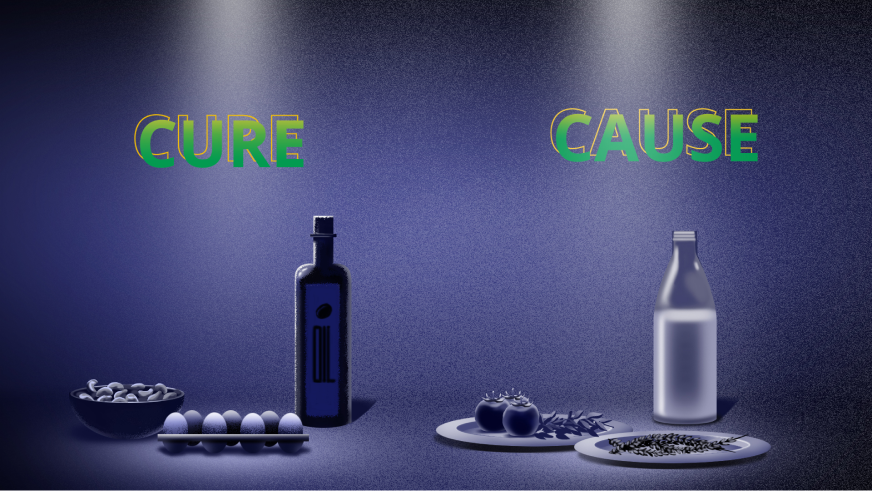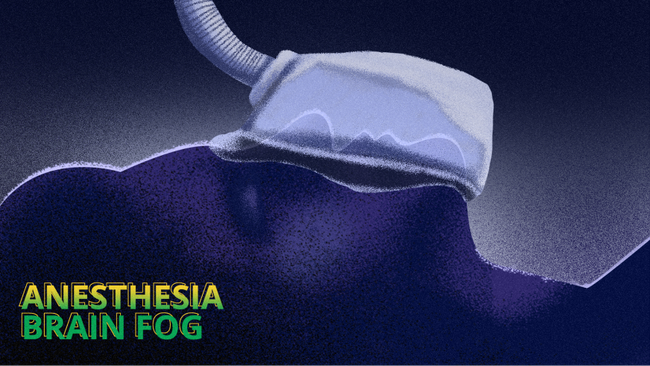Something that almost everyone wants to know is how to get rid of brain fog. Depending on the person, brain fog can last for a few minutes or decades. It is frustrating to experience, and it often signifies a larger problem. It can be a sign of a chemical, emotional or physical imbalance. Even if it seems like the fog will never dissipate around your brain, it is reversible. You just need to know why brain fog is occurring and how to fix it. In this article, you’ll learn the cure for brain fog, and the vitamins, food, and other tips and tricks to cure your brain fog.
Best brain fog cures
Table of content
1. What to eat to cure brain fog? (and what not do eat)
Your diet can not only cause brain fog, but it can also cure it. Some foods can trigger brain inflammation, putting you in a fog right after you eat. Foods that cure brain fog are:
- Nuts
- Avocados
- Coconut oil
- Olive oil
- Wild salmon
- Eggs
- Grass-fed meat
Some of the foods that can be responsible for brain fog are:
- Lectins (beans, peas, legumes, lentils, tomatoes, eggplant, and peppers)
- Gluten
- Wheat
- Casein (found in all dairy products)
- Yeast
- Artificial and natural sweeteners
There are many more options that you can include in your diet. You can check them here: what to eat and drink to eliminate brain fog?
Identify any food intolerances
According to some estimates, the prevalence of brain fog in people with depression is 85–94% during depressive episodes and 39–44% during periods of remission.
The easiest way to identify a food intolerance is to test for Ig-G mediated antibodies. This isn’t always feasible, so the next step is to see if you experience any of the following symptoms relatively soon after a meal. This means within 24-hours not several days later.
- Nausea
- Headaches
- Irritability
- Nervousness
- Stomach pain
- Bloating and/or gas
- Loose stools
If you experience one or more of the symptoms every time after eating a specific food, it is most likely an indication that you are intolerant and need to change your diet.
Eliminate bad carbs
According to some estimates, the prevalence of brain fog in people with depression is 85–94% during depressive episodes and 39–44% during periods of remission.
It’s difficult for a lot of people to completely give up bad carbs. Mainly because these foods are always delicious. However, even a former president was admonished to watch his diet. When Dean Ornish stated,
“In 2010, I consulted with President Clinton after his bypass grafts occluded and encouraged him to make healthy lifestyle changes including a whole-foods, plant-based diet low in refined carbohydrates”.
Reducing your carbohydrate intake will not only reduce brain inflammation, but it can also improve gut health and boost energy levels. An added bonus is that you can also burn off unwanted fat.
It is a good idea to go slow when your “giving up” sweeteners. Irritability and fatigue are common symptoms of sugar withdrawal.
Fast
According to some estimates, the prevalence of brain fog in people with depression is 85–94% during depressive episodes and 39–44% during periods of remission.
Fasting can improve brain fog and before you panic, you don’t have to go without food for an extended length of time. However, short-term fasting has shown that it can increase BDNF – a protein associated with nerve growth. In layman’s terms, BDNF helps grow new pathways and circuitry in the brain, along with cells.
Studies show that not only does BDNF improve brain function by eliminating the “fog”, it can also reduce a person’s risk for developing Alzheimer’s and dementia.
2. Which vitamins are good for brain fog?
Three main vitamins required to keep your brain functioning well are:
-
Vitamin B12 - Naturally found in animal products, including fish, meat, poultry, and eggs, Vitamin B12 deficiency can lead to anemia, as well as nerve and brain damage which may manifest in symptoms such as brain fog, memory problems, fatigue, depression, muscle fatigue and tingling in the extremities.
-
Vitamin D - The sunshine vitamin, produced when you spend time in the sun is extremely important. It can be found in fish, seafood, mushrooms, and egg yolk. Vitamin D deficiency can lead to memory loss and dementia.
-
Vitamin C - Found in citrus fruits, tomatoes, potatoes, red and green peppers, and broccoli, Vitamin C acts as an antioxidant. This antioxidant is used to repair your brain cells, and protect it from all the stresses it goes through day to day.
3. Exercise
Even Hippocrates understood the importance of exercise.
“If we could give every individual the right amount of nourishment and exercise, not too little and not too much, we would have found the safest way to health.”
Some of the problems that often occur due to lack of exercise can include,
- Stiffness in the joints
- Limited range of motion
- Bone loss
- Weight gain
- Loss of lean muscle mass
- A weakening of the cardiovascular system
- Mood disorders – Depression/anxiety
Regular exercise helps to regulate BDNF levels in the brain, effectively reducing brain fog. Remember, BDNF is what promotes cell growth so your brain can continue to grow and replace dead cells. This is positive when it comes to your overall health.
Some types of exercises that are great for reducing brain inflammation are aerobics and other cardio-focused activities. This includes jogging, walking, spin classes, and exercise bikes. While these exercises will give you the desired effect, there are two that are specifically designed to eliminate brain fog. The first is coronal plane exercises and the second is moving your eyes along the horizon.
There is a very good reason why these exercises are especially good for combating brain fog.
Think about the typical motions you perform every day. Most are midline, involving only forward and backward motions. This includes,
- Sitting at a desk
- Working on the computer
- Driving
- Walking
- Browsing social media platforms on a phone or tablet
The only movement you get is when your eyes scroll up and down. Your arms and legs only get slightly more movement, but it is only back and forth. This even applies to some popular types of exercise machines. Treadmills, ellipticals, stationary bikes, and stair steppers all require only limited movement. This isn’t enough movement to prevent the problems lack of exercise can cause.
Types of exercises to do
Exercises that call for movements away from the midline are coronal plane exercises and they’re easier to perform than the name implies. Some examples are,
- Skater squats
- Side to side jumping
- Twists using a medicine ball
- Jumping-jacks
- Side lunges
- Spiderman pushups
- Running in place with legs spread out.
Not only will these exercises strengthen weak muscles, but they’ll also clear out brain fog.
Exercise your eyes!
Stress levels are increased when your eyes simply scroll up and down. Scrolling through Facebook posts and other social media platforms is the main cause of this problem.
4. Sleep well
Sleep is important, just read what Walter Reisch has to say about it.
“Tired minds don’t plan well. Sleep first, plan later.”
Technology is one of the biggest contributors to stress in our brains. The blue lights that make a device so easy to see, also make it difficult to fall and stay asleep. For a healthy night’s sleep, the body needs to enter a state referred to as REM. This is when we enter a state of deep, healthy sleep. Without, you will wake up feeling groggy and stay that way all day.
The blue light emitted from devices also interferes with melatonin production. This is the chemical produced by the brain that helps calm you and encourages sleep. This results in you sleeping late and having less sleep, which is one of the major reasons behind brain fog.
To prevent a lack of sleep from weakening your frontal lobe you’ll want to make a few changes to your nightly routine.
Remove all blue lights:
Stress levels are increased when your eyes simply scroll up and down. Scrolling through Facebook posts and other social media platforms is the main cause of this problem.
Experts recommend turning off devices two hours before bedtime, though this can be hard for some people to do. You also want to turn off all lights and if necessary close the drapes or blinds. You want your bedroom to be as dark as possible to signal the brain that it’s time to go to sleep. Now it knows it’s time to start releasing the appropriate hormones.
Get rid of your pillow
Stress levels are increased when your eyes simply scroll up and down. Scrolling through Facebook posts and other social media platforms is the main cause of this problem.
Hypoxia is a condition that occurs when your oxygen intake is reduced during sleep. This can leave you with brain fog all day. There are a few ways you can improve your oxygen intake and quality of sleep at night.
The first step is to have a sleep position that promotes spinal alignment. This automatically improves oxygen uptake. The best way to do this is to toss out your pillows. For some, this will be difficult but you will sleep better without them.
Sleeping without a pillow extends and rotates the neck. This means that it’s aligned with your spine, instead of bent from the height of the pillow. This improves your posture, which promotes several health benefits. One of which is preventing your spine and/or neck from becoming permanently bent. Poor posture is also linked to a higher mortality rate in men and women.
So, if you have to sleep on your back it’s better for your brain and physical health to get rid of your pillow.
Stress management
With the modern day to day stresses of today’s world, you need to find time to relax. Whether this is through meditation, or just controlling your inner world and thoughts. Your thoughts and motions are controlled by the same three areas of the brain which is why there is such a strong correlation between exercise and a person’s mental health. The three areas of the brain are,
- The Cortex initiates both thoughts and physical movements
- The Basal Ganglia filters out unwanted thoughts and movements.
- The Cerebellum coordinates thoughts and movements, editing when necessary.
When you improve your mental and physical health, you’re also boosting your brain’s. The stronger your brain is the less chance of it becoming inflamed. You want to employ practices that strengthen and hone your brain.
Train your mind
Training should always include exercises for the body and mind. Some exercises that can strengthen your mind include,- Daily affirmations
- Meditation
- Forgiving yourself and others
- Having and showing self-compassion
- Actively practice self-care
- Stick to a set morning and evening routine
Also, check out some more natural remedies that you can easily apply every day to get rid of mental fog.
Can brain fog really be cured?
Brian fog can be caused by several underlying conditions, but most often it’s the result of a bad diet, lack of exercise, poor quality of sleep or problems keeping your mind fit and active. It can be one, all, or a combination of these four factors but the result is the same. Your brain is trapped in a fog. Taking care of yourself mentally and physically will, in turn, boost your brain health. If your brain fog isn’t a symptom of an underlying chronic condition, then it can definitely be cured through the aforementioned measures.







































